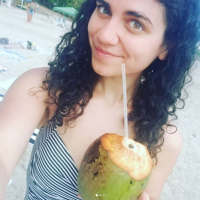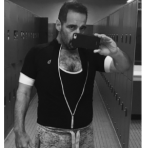Search the Community
Showing results for 'alcohol'.
Found 17,501 results
-


So afraid I am going to screw this up.
MarinaGirl replied to melty29's topic in Gastric Sleeve Surgery Forums
I gave up unhealthy food & beverage favorites months before surgery. It was hard to give up sugar, processed food, bread, soda, and alcohol but I wanted to make a lasting change and to not go through "detox" and have to deal with cravings right after surgery. This approach worked well for me and I'd recommend others consider doing the same to prepare for your new lifestyle ahead of time. -


Tell me your Gallbladder Story...
ElysiaDee replied to Ldyvenus's topic in General Weight Loss Surgery Discussions
I had my gallbladder removed 11 years ago. I've had non-alcoholic fatty liver ever since I was pregnant with my son, he just turned 14. Now I need WLS to help me try to get my liver finally healthy before I develop really bad cirrhosis. I've greatly improved my diet and health over the years, and tried many things to try my best to improve my liver health, but even with so much effort my liver hasn't been improving and I have had a lot of trouble losing much weight, that is why I'm getting WLS as soon I am allowed. I should hopefully finally receive my surgery date sometime next month. My liver specialist recommended it to help me finally get the rest of my excess weight off and get my liver health back. At this point I am finally no longer afraid of WLS, now I am much more afraid of what can happen if I don't get it. -


Starting the Liquid Diet
EmmyJ replied to completelylex's topic in PRE-Operation Weight Loss Surgery Q&A
The real answer is ask your doctor and see what they say. My personal answer is probably no, since you're trying to keep your liver as shrunk as possible for the surgery, and this liquid diet is basically practice for after the surgery anyway, when alcohol is definitely a no no. But, again, that's just me, and you should ask your surgeon this question. -
I am starting the Liquid diet on Monday 7/31. I have just turned 21, which means all of my friends are turning 21 too, and next Friday night 8/4 I got invited to go to a campout. Is it safe/ok for me to drink alcohol while on the liquid diet (2 weeks) pre-operation? My surgery date is on 8/14
- 1 reply
-
- alochol
- liquid diet
-
(and 1 more)
Tagged with:
-


Taking a Cruise after Surgery
OutsideMatchInside replied to iamjohnbamber's topic in Gastric Sleeve Surgery Forums
Cruises don't interest me as a world traveler because of their track record, I would never go on one, especially not as a woman. My opinion is based on the fact that there are always lots of cruise and food questions posted on WLS forums (just like this one). No one ever posts that they went rock climbing, swimming and had a blast or talk about their excursions (these are all some of the things that are available on cruises), not to mention the entertain shows on board. All people do is whine about the food, and drinks and try to figure out how to drink alcohol even before they are 6 months from surgery. You made a thread about cruises and food, but you are complaining that someone is asking questions about cruises and food? If there is more to do on a cruise than eat, why are you complaining about the food situation on the cruise? If food wasn't an issue or you had such a great time, why would the wait staff asking you a few questions be worthy of a forum post and a youtube video? You are making it seem like food is the central attraction and issue on a cruise. If everything else on the cruise made a greater impression, you wouldn't even care about the food issues. I went on vacation this summer and food was not the highlight of my vacation or a major issue (and I had lots of delicious food at some great restaurants), I went hiking, kayaking, shopping and a lot more. Food isn't my focus, I eat to live, not live to eat. So why all the cruise and food and alcohol posts? Why a cruise when you can just fly somewhere, and stay at a resort with activities? -


To Tell or Not To Tell
Airstream88 replied to Polly Pocket's topic in General Weight Loss Surgery Discussions
From the very beginning I told everyone. I didn't feel like having to hide why I am eating so little now, not drinking at meals, not drinking alcohol, etc. Everyone I've told has been very supportive, at least to my face. The manager at the local Zoe's Kitchen still comes up to me and says how great I'm doing. But even if someone started giving me grief, I could care less. It's my life and my body, not theirs. You can't control how people behave, you can only control your reaction. -
I don't really consider it cheating if I have a really small scoop of carb smart ice cream and then stop at that. You will need to decide if you can handle just something small like that. It really depends if you have an eating disorder (binge, addiction) or not. I got sugar free popsicles and eat them daily. I also got some sugar free candies and limit myself to 2 a day because the sugar alcohol can cause stomach discomfort. I had to completely cut off any kind of regular candy - chocolate was my nemesis. I won't eat that again. Mich W Hw 223, SW 217 CW 198 GW 135
-


No judgement please
OutsideMatchInside replied to Joni :)'s topic in Tell Your Weight Loss Surgery Story
I have been tp the gym maybe 5 times not counting my stint with crossfit to meet men. You can't out train a bad diet. You can erase 2 hours in them gym with a few bites of a bad food choice. So working out doesn't matter if you aren't eating right. Most peoppe with RNY don't dump, at least not long term. They might at first but once their intestines adapt they no longer do. Which means at 1 year or 18 months they are stalled out or regaining from bad food choices like anyone else. The sleeve is just a tool, it can't save you from yourself. You have to make the right food choices that work with you sleeve not against it. You can easily get back on track but you are going to have to accept that some things are not helpful for losing weight, like alcohol and other nutrient devoid foods. -


Keto vs paleo??? Have you ever tried it?
Clementine Sky replied to xoxococojay's topic in Post-op Diets and Questions
Oh, to clarify - I've never strictly followed paleo, but rather followed more of the lower but not low carb eating style that is similar to it. I definitely eat cheese. To add - I've never put any food on the forbidden forever list. For me, anytime I tell myself I can't have something, I then crave it. That food becomes the proverbial forbidden fruit that I'm the most tempted to have. Instead, I try to eat sensibly, with a focus on protein and then healthy carbs such as low GI fruit in moderation. I've had cheesecake, ice cream, alcohol, you name it in the nearly two years since having the VSG, but less than a handful of times. By not banning myself from a food, I actually desire it less because I don't feel any sense of deprivation. -


Revised band to sleeve 12 days ago... mini freak out
TheSleevedTraveler replied to TheSleevedTraveler's topic in Gastric Sleeve Surgery Forums
Just an update so I'm now at about 6 weeks post surgery and I'm feeling so much better. I am eating more normal food like a hamburger (no bun no toppings) - fills me up for many hours. I am not brave enough yet to try steak or chicken, sticking with ground meats and seafood for now. Learning new habits like don't drink and eat at the same time - super hard to do. Also learning that meals at restaurants come with way too much food for me to handle. Skip the soup salad bread even the side dish and just eat/get the main protein and work on eating that. I'm 10 pounds from goal weight. Taking my first business trip on the road and flying tomorrow, starting to finally feel somewhat "normal" again. Oh lastly alcohol- it's a whole different thing now for me. Not nearly as enjoyable as it was before. Your mileage may vary. Good luck everybody. It definitely gets better. The first month is the hardest. -


May 15th, 2017 Sleevers Check in Here!!!
Missy161 replied to Newme17's topic in Gastric Sleeve Surgery Forums
I only had a 4 day pre op because I had been traveling and my doc said he'd do it just after I got back- probably because I was a lower bmi. He said my liver wasn't fatty at all when he went it which totally surprised me- my gi had said a year before that my liver looked like an alcoholics liver even though I barely drink. I lost 6 pounds in those 4 days. Mich W Hw 223, SW 217 CW 199 GW 135 -


May 15th, 2017 Sleevers Check in Here!!!
Missy161 replied to Newme17's topic in Gastric Sleeve Surgery Forums
I only had a 4 day pre op because I had been traveling and my doc said he'd do it just after I got back- probably because I was a lower bmi. He said my liver wasn't fatty at all when he went it which totally surprised me- my gi had said a year before that my liver looked like an alcoholics liver even though I barely drink. I lost 6 pounds in those 4 days. Mich W Hw 223, SW 217 CW 199 GW 135 -


May 15th, 2017 Sleevers Check in Here!!!
Missy161 replied to Newme17's topic in Gastric Sleeve Surgery Forums
I only had a 4 day pre op because I had been traveling and my doc said he'd do it just after I got back- probably because I was a lower bmi. He said my liver wasn't fatty at all when he went it which totally surprised me- my gi had said a year before that my liver looked like an alcoholics liver even though I barely drink. I lost 6 pounds in those 4 days. Mich W Hw 223, SW 217 CW 199 GW 135 -


Any August 2017 Sleevers?
Seamehyde replied to Jessalene's topic in PRE-Operation Weight Loss Surgery Q&A
Just wanted to put this out there for those soon to be surgeries. I've read so much about how bad the gas will be the first few days and the necessity for the Gas-X DISSOLVABLE Strips. You might want to get them ahead of time. They may not be easily found in stores (although Wal-Greens has them). They were about $6.00 per 18pkg, recommended 2-3 at a time. Wal-Mart does not carry them in store(or not in all stores) CVS does not either. Amazon had them listed from about $9 up to $30. Crazy prices. It's been said they are discontinuing them but I suspect they will probably come back at a higher price due to increasing needs due to bariatric surgeries etc...All I could find were the mint flavored but I'll probably need them for fresh breath anyway. I got 4 boxes to be safe....I had to order because our nearest Walgreens is 50 miles away. Trying to make sure I have everything needed for the first week or two. Found that zero Gatorade too. I'm just ready to get this party started. Cooking supper tonight, all I could think of was how I'm going to miss my veggies. Crazy right, ok with giving up alcohol and desserts, I'm going to miss my steamed veggies, cabbage, asparagus. I only have a 24 hr liquid diet but, I'm going to start a week earlier and be diligent the last 3 days. Dr. said no need but this is one time I'm going to go with my gut. I'll abide by his orders afterwards. (smile) Have a great weekend everyone! -
Hi I am 6 months post op and have just had my first drink of alcohol, I had about 7 sips of rose wine and the I started sweating profusely but was shivering all over and felt sick!! What was that and has anybody else had the same happen to them? Thanks in advance.
-


First Time Drinking Alcohol Post Op
TheBearguy8 replied to learning to fly's topic in POST-Operation Weight Loss Surgery Q&A
Easy there trigger. That's a lot of absolutes and assumptions out there, and although caution is always advised, testing with any new thing to consume is always good. "Sabotage your entire surgery?" Where the hell do you get your information? I notice you didn't say HOW it was supposed to accomplish this ""SABOTAGE!"". Don't fear-monger. You also make an assumption about calories. True for some choices, but not all. I drink a bourbon on the rocks (top shelf Knob Creek) maybe twice a week since week 7. Do your research on bourbon, scotch, and tequila. (I'm not going there for a long while) I started with ONE TINY SIP. waited a full hour for my staples to magically and hysterically melt, violent vomiting, a new addiction to alcohol, and a trip to the ER. None of that happened. Not even nausea. Nicely the bourbon lasts longer. Strangely, my favorite brand Dewars has completely changed taste in my mouth, and I have to go way high quality for a smooth taste experience. Avoid absolutes that come from YOUR medical, NUT, and doctor choices. -


First Time Drinking Alcohol Post Op
dyemond11 replied to learning to fly's topic in POST-Operation Weight Loss Surgery Q&A
My Dr. Told me to never drink alcohol after surgery, and my NUT told me after 1 year. I know it stretches the stomach as well as soda. -
Hello all! Just a question for all the vets out there, just trying to determine if what I am "feeling" is actually ketosis? This happened during pre-op, and immediately after the surgery. Then it stopped during my stall, and now that I am out of the stall it started again. My symptoms...It feels like I have the constant taste of alcohol in my mouth, almost like a burning sensation. It doesn't seem to be coming from my mouth per se, but more from like the inside of my body and my mouth is acting like an exhaust system for the vapors (not a very good description, but the best I could come up with, sorry). It's like...like I am doing gargles with vodka all day long!!! It's just a very weird feeling/taste that I can't get rid of, no matter how much water I drink. And I also have a constant feeling of something stuck in my throat, although that may be unrelated? Also, when you were in ketosis, was the smell limited to just your breath or did you excrete it through your body as well? I am just curious... Thanks all!
-


First Time Drinking Alcohol Post Op
Stephen2 replied to learning to fly's topic in POST-Operation Weight Loss Surgery Q&A
My doc & my dietitian recommended no intoxicants for 12 months post-op. That is probably edge-case recommendation, but I'm not much of a drinker anyway, so I'm going with it (six months post-op, so far). They explained a counter-intuitive reason for avoiding it, which has stuck with me. I didn't get to where I was by being completely free of obsessive tendencies. It is quite common for folks to transfer their food habits to other self-medication options and obsessions. Obviously, alcohol is one easy ride to climb onto, so for that reason I'm pretty much staying away until I'm a little more secure with my new life. I've had a couple of tastes - literally a sip from my wife's glass. But that's it. I'm a fan of whiskey, but so far, I've completely set that aside since my surgery. My very nice collection sits in the case untouched, for now. -


Why do we fall off the wagon? & How to get back on?
Greensleevie replied to bostonmama's topic in General Weight Loss Surgery Discussions
Also, I work in addiction. You know the first indicator I see when I know someone is going to relapse? They swear they are NEVER going back to drugs or alcohol. They don't have enough insight to understand that absolutes and extremes just don't work in the real world with real world challenges. They get blindsided when they happen and deal with them the only way they know how....resorting back to their old self destructive behaviors. The more successful clients understand that although they can't promise they won't ever go back, they will work their programs the best they can, use the tools they've been given and deal with the challenges they know will happen as they come in order to be successful. They don't assume to know it all, either. -


Why do we fall off the wagon? & How to get back on?
Jeffrey Stern replied to bostonmama's topic in General Weight Loss Surgery Discussions
Well to all those who are saying how easy it is to so called "slide down the slippery slope" or hit "those rocks in the road" and us newbies who "have the tiger by the tail" and every other idiom out there all say that you obviously weren't mentally ready to engage in this new world of self awareness. Again...having surgery which ever method you decide to have..lap band, sleeve, or bypass... THIS IS NOT MAGIC SURGERY. It does not give you the permission to go out after words to the nearest buffet or fast food place or buy a family size bag of potato chips, and think OOHHH boy I had some magic surgery now I can eat anything I want (not to mention the unmentionable...exercise) . NO NO NO. So you need to decide am I going to be successful at this or not. If you are making excuses like "nobody is validating me any more" ... you're becoming healthier ..are you doing this for them or yourself? I'm going to try eating more sugar...why? I personally have type 2 diabetes and got so tired of taking large amounts of insulin everyday. I can't drink alcohol any more... boo hoo...maybe you have another issue to deal with?? What's an occasional splurge ? really? Cut out carbs all together.. again I made a decision to not eat carbs/ gluten anymore. There are so many subs to replace all the bread, rice, and pasta you crave. Try some. Any one of your Nuts out there will tell you if your putting more calories in your body than your burning your doing something wrong. SO NO SLIDDERS ! So if all you who have been out for 3 or 4 or 5 yrs plus have just forgotten why you had the surgery to begin with. Maybe you need a second so called "HONEYMOON" a few of you mention all the failures out there...what about all the successes !!! which I will be one of...It's not BULLSHIT... Obesity is manageable. Some of us need extra help such as the surgery of your choice...but healthy eating is a close second option. So make all the excuses you want. That's what they are EXCUSES. Nobody has a gun to your head saying eat that junk.. it was all your decision. So hate me all you want I will talk to you in 3 or 4 or 5 yrs from now and still be on my "HONEYMOON". -


Why do we fall off the wagon? & How to get back on?
Greensleevie replied to bostonmama's topic in General Weight Loss Surgery Discussions
It's SO easy to be cocky newly post op (1-2 years). I remember. You think you have the tiger by the tail. Then the honeymoon period ends. Suddenly, you're hungrier. You can eat more. You've settled into "boring" maintenance. You no longer have the thrill of the scale moving downward. People are used to how you look now, and you aren't getting the validation of constant compliments on how great you look. You're fully healed and feel as normal as you did before surgery, and sometimes you're alarmed by how much more you can eat and how much hungrier you are. Behavior fatigue sets in, and you push the limits of how much sugar or alcohol or carbs you can consume before you see a gain. After all, you pretty much could still lose early out even after the occasional splurge. And if you did gain a pound or two, a couple days of cutting back on carbs and some extra water, it came right back off. Until you discover it doesn't work that way anymore. You gain much easier now for seemingly no reason, and no matter how hard you try, the weight won't come back off like it did before. You become complacent, almost accepting a 5, 10, or even 20 pound gain because it becomes so hard to lose it again. We won't even talk about the guilt and self loathing regain causes. You feel like a failure (even though you really aren't). A fairly new post op has no idea the struggles people 3, 4, 5 years out and more have, so telling people to just suck it up and have more willpower is utter bullshit. -


First Time Drinking Alcohol Post Op
lilbigprsn replied to learning to fly's topic in POST-Operation Weight Loss Surgery Q&A
I'm trying to understand why wine would be a problem or anything under 7%. They gave me hydrcodone and it has 7% alcohol. -


Coping mechanisms
zoegastricsleeve replied to KateD's topic in PRE-Operation Weight Loss Surgery Q&A
I 100% have those worries. I feel as though eating, drinking alcohol and smoking are all the fun things in my life and that once I have the surgery and can't do those things, then I won't have fun. I am going to speak to someone about it as I don't want to develop adjustment issues or anything like that. I think we just have to find something that brings us as much joy as food and all those nasty things I am getting a puppy about a week after the surgery so I have that to look forward to and I know she will keep me busy. Good luck! I hope it all works out for you. I feel as though we aren't alone in our feelings and if everyone else can do it then we can too Sent from my SM-N9005 using BariatricPal mobile app -


4th WLS procedure coming up this week!!! No judgement!
sydneyjonno replied to sydneyjonno's topic in General Weight Loss Surgery Discussions
Hi, thanks for your reply. I do realise that this will probably be the end of the road as far as surgery is concerned and I'm pleased about that as I don't want any more surgery. I have always had problems with portion control and grazing and have been working hard to deal with it, I am pleased at your will power and apparent success at conquering this issue. For me I am still hungry after eating 2 cups, of course I try not to eat and I swap unhealthy foods for healthy options and choose proteins first. But it's not always easy, hence most of our decisions to have surgery in the first place. I have also given up smoking after 25 years of smoking 2 packets a day and no longer drink any alcohol at all. I do have will power but for me it seems that I am gaining weight after an initial reasonable loss with the bypass, so for me my next option, which my surgeon agrees is the Overstitch. I had also started Saxenda with great initial results, I have only been on it for 2 weeks and am still titrating the dose but have noticed a marked decrease in appetite and have lost 4kg! Happy days, I am determined to get where I want to be eventually.




